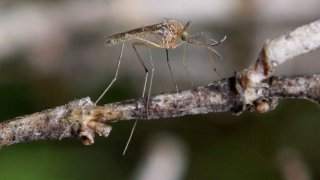
San Diego County health officials said a mosquito recently captured in the Black Mountain Ranch area has tested positive for West Nile virus – the first appearance of the virus in San Diego County in 2020.
The case comes on the heels of mosquitos in other Southern California areas testing positive for West Nile virus and St. Louis Encephalitis this week. San Diego County health officials said the mosquito was caught in routine trapping.
Although West Nile virus is commonly found in a variety of birds, it can also be transmitted to humans by the bite of an infected mosquito, according to the Centers for Disease Control and Prevention.
This includes Clux mosquitoes native to San Diego and three types of Aedes aegypti mosquitoes also found in San Diego County, county health officials said. In the latter, they feed off an infected bird and then bite people.
Aedes mosquitoes are day-biting and have been found in San Diego since 2014 and can also transmit chikungunya, dengue and Zika, if they first bite an infected person. Aedes mosquitos are small and black, with white stripes on their legs and backs.
There are no vaccines to prevent West Nile virus or medications to treat the disease.
Local
County health officials say 20% of those who are infected suffer symptoms, which include fever, headache, nausea, fatigue, skin rash or swollen glands. But, in rare cases – like one in 150 infected people, according to the CDC – the disease can turn deadly.
The CDC says most cases of West Nile virus happen during mosquito season, which starts in the summer and runs through fall.
So, San Diego County health officials are reminding people to protect themselves from mosquitoes by dumping out standing water in and around homes, as standing water is where mosquitoes like to breed.
This includes water in plant saucers – inside and outside – rain gutters, buckets, trash cans, toys, and wheelbarrows. Because people are spending more time at home due to the coronavirus pandemic, residents may be more vulnerable to mosquito bites, officials said, so getting rid of any standing water is key.
Locals can report mosquito activity to the county here and should also follow the county’s guidelines of “Prevent, Protect, Report” when it comes to the virus. Stagnant, green pools or dead birds – both mosquito-breeding sources – can also be reported to the Vector Control Program at (858) 694-2888 or via email at vector@sdcounty.ca.gov. The county’s Vector Control Program will also give out mosquito fish, for free, which can be used to control mosquito breeding in pools, ponds, and fountains.
In addition to dumping stagnant water, the CDC and local health officials say you can protect yourself against mosquito-borne illnesses by wearing long sleeves and pants and using insect repellent that contains DEET, picaridin, oil of lemon eucalyptus, or IR3535. More information on mosquitoes in San Diego County can be found here.
County health officials said cases of West Nile virus were mild in San Diego County in 2019, with three people testing positive. All three were suspected of contracting the virus while traveling outside the U.S., and all three survived.
In 2015, San Diego County had 44 residents test positive for West Nile virus, and six of them died.



